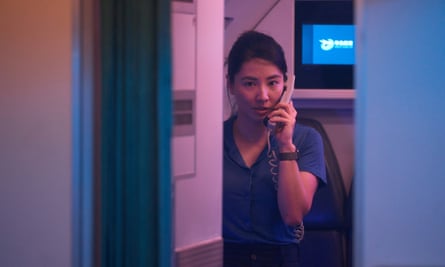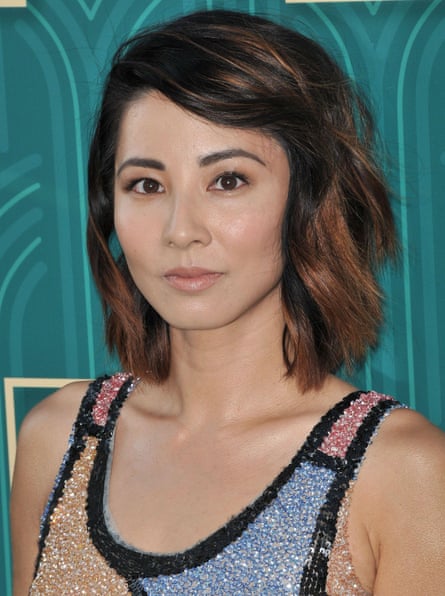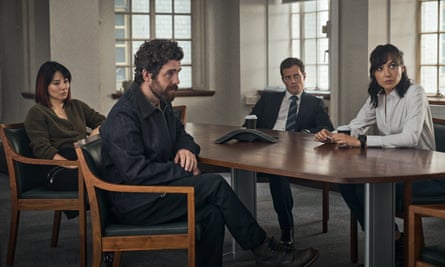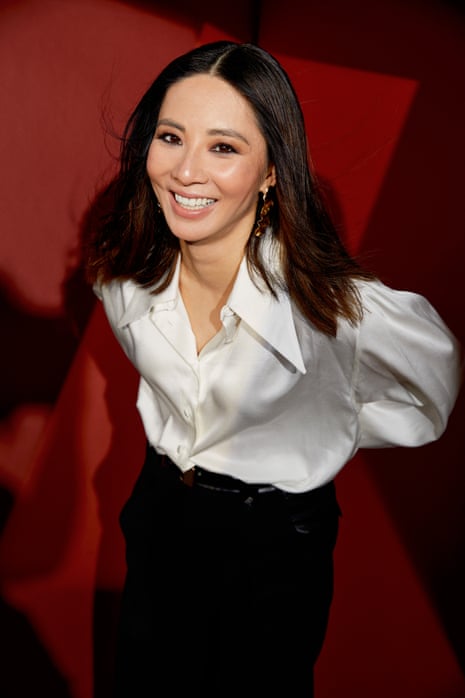As a teenager, Jing Lusi was something of a wild child. She was smoking and drinking by the time she was 13, frequently ended up in detention at school and even got suspended for smoking on school premises. “I needed to let off steam,” she says. The actor was rebelling against her strict parents but also against the stereotype of east Asians as well-behaved, “dorky” students. Hers was one of the few Chinese immigrant families living in Southampton in the 90s. She just wanted to fit in. “I managed to get through school by adopting this persona of: ‘I’m wild and erratic, don’t pick on me because I’m not submissive.’ It’s kind of stuck,” she says with a laugh.
Lusi has spent her career successfully dodging stereotypes. After a long-running part in the BBC’s Holby City, she appeared as a detective in the first series of the dark crime drama Gangs of London in 2020, and an MI6 agent in the 2023 spy thriller Heart of Stone. Her most high-profile role to date, though, was as a scheming lawyer – and the ultimate frenemy – in 2018’s Crazy Rich Asians, the trailblazing romcom featuring an all-Asian cast.
Now, Lusi is breaking new ground with ITV’s nerve-jangling thriller Red Eye. It is a significant development: Sandra Oh, a Canadian-American actor of South Korean descent, won acclaim for her role in Killing Eve, but it is still extremely rare for a mainstream British TV series to feature an east Asian lead.
She plays DC Hana Li, a tough, no-nonsense London detective tasked with taking a doctor (Richard Armitage) back to Beijing to face murder charges after he is accused of killing a young woman. When passengers start to die during the fraught plane journey, Hana begins to suspect that all might not be as it seems.
The part struck a chord with Lusi. “Hana struggles with her identity in terms of fitting in, being an immigrant, and having a mixed-race sister and a white stepmum. It’s like: where’s my place in this world?” says the 38-year-old actor, a sunny bundle of energy on the blustery day we meet. “That definitely is how I felt growing up.”

Lusi was born in Shanghai and emigrated to England with her father, a university lecturer, and mother, a teacher, when she was five. Settling into her new life in Southampton was a huge culture shock. “I didn’t speak a word of English. My mum was so paranoid that I would humiliate myself, she taught me two words to go into school with: ‘me toilet’, which isn’t even correct grammar! Five-year-old me wandering around not being able to say anything except ‘me toilet’ … ”
Her parents couldn’t afford to pay for hot school meals, so they made her a packed lunch every day. “They were trying to be English, so they tried to make a sandwich. They didn’t know how, so they got this roll with lettuce and just doused it in ketchup. I was like: ‘What is this?’ I’m used to really good Shanghai cuisine.” Her school only allowed children to play outside if they had finished their lunches. Lusi couldn’t bring herself to eat all of hers so would be kept inside the canteen at lunchtime. “I could see all my friends playing. It felt like a punishment,” she sighs. “Little me went through a lot.”
When she was 10, she discovered acting. A teacher suggested she audition to be part of a children’s choir that would feature in a production of Joseph and the Amazing Technicolor Dreamcoat, starring Phillip Schofield, at the Mayflower theatre in Southampton. On stage during the seven-week run – dry ice swirling and the orchestra playing in the pit in front of her – Lusi was struck by a feeling of liberation and joy. “Seeing the smiling faces of the audience, I was like: ‘This is what I want to do with the rest of my life.’”

She tried out a more sensible path first, studying law at University College London, in-part to appease her parents. But after she graduated, she had to break the news that she had decided to pursue acting instead, and had enrolled herself in classes. “My dad thought it would go away. Even after a long time, he was like: ‘So when are you going to do your master’s?’ I had never really stuck with anything when I was younger, so he thought this was a phase.”
Acting came naturally to her. When she first started having therapy, at the age of 27, Lusi’s therapist told her she was drawn to acting because she had always been pretending about who she was. “That really hit home, because I don’t think I ever [knew] who I was. Our house was so Asian and I would step outside and be British.”
Working on Crazy Rich Asians, alongside co-stars Awkwafina, Constance Wu and Henry Golding, was a transformative experience for Lusi – one that she compares to being in “summer camp”. “I don’t think there were ever less than 10 people in a room together,” she says. “We were this travelling centipede.” From the moment she woke up, her phone would be pinging with messages from the cast’s WhatsApp group. They would spend their time off from shooting in Singapore eating at dim sum restaurants and singing karaoke.
“There was an intrinsic understanding that we were making history,” Lusi says. “We didn’t know what it was gonna be like, but we were like: ‘Shit’s gonna change from this moment.’” The response from Asian cinemagoers was overwhelming, and the film became one of the highest-grossing romantic comedies of all time. “This is a huge population that has never seen themselves represented in a positive way.”
Lusi’s early days of auditions were tough. There were limited roles for east Asian actors at the time, and the ones on offer were lazy cliches. “All I got was prostitute, takeaway worker and illegal immigrant that would sleep with anything for a visa. You have to put on an accent. I’d just graduated in law at UCL. I was like: ‘Is this how you see us?’ It was really quite heartbreaking. It was a wake-up call.”
The humiliation didn’t stop there. Lusi recalls with a shudder an audition for a role in a Netflix series in which she was asked to simulate having sex with a chair. “The casting director was so apologetic. She said: ‘You can just stroke the chair.’” Lusi was mortified. “I sometimes feel so sad for my 20-year-old [self]. I wish I could be in that room, hug her and be like: ‘Let’s just leave. You don’t have to do this.’” Now, she would act differently. “I would just read them the riot act.”
Lusi is relieved that she never landed these parts; was never forced to compromise her integrity just to get a foot in the door. Even though she would turn up to these auditions, she carried herself with the energy of someone who didn’t really want the role, “like an unconscious silent protest”. When she got her big break in Holby City in 2012, it taught her that “there are better things out there. You just have to wait for them and you have to seize the opportunity. You will align with what’s good for you.” The part of Tara, an eager doctor who was killed off the next year by a brain tumour, felt progressive. “I remember it feeling so refreshing that her ethnicity just wasn’t discussed.”
Nowadays, Lusi is better at speaking up, standing her ground and saying no if she has to. She points out the irony that “the more you say no – not in a diva, asshole way, but an ‘I don’t feel comfortable with this’ way – the more stuff comes to you. When we’re younger, we believe that saying yes to everything is what makes things happen.” But she has stopped saying yes to things “from a place of insecurity or unworthiness and the need to appease other people. If you go, ‘No, I want better, I trust it will come along’, then it does.”
This need to appease others has left her in some risky situations in the past. Lusi talks about the times she would agree to go for business meetings in bars with male directors whom she had met on casting websites. “I didn’t tell anyone where I was going. I didn’t tell anyone who this person was. If anything had happened to me … Jesus Christ, you really throw the die.”

Lusi has never had any problems with speaking up for herself in her personal life, though, especially when it comes to calling out racism. When she was growing up, she was used to people on the street randomly yelling out the Japanese greeting “konnichiwa” to her, unable even to get her ethnicity right. But on the day she passed her A-levels, a stranger screamed out across a car park: “Ni hao, can I have some chicken fried rice?” She lost it. “I started a fight and it got physical. I was just like: ‘Why is this in my world?’ It’s upsetting and I know if it’s happening to me, it’s happening to most Asians. You don’t go down the street yelling at a white person.”
Years later, in Hackney, another man started shouting about Bruce Lee as she walked past him. “And he did that” – she spreads out her arms, mimicking the martial arts star’s trademark crane pose. But this time, Lusi determined to confront him about what he had done and how demeaning it had been. “It wasn’t aggressive. I was like: ‘What you’ve just done is judge me on my ethnicity, and make that a thing and yell something at me that is odd.’” As amicable as the chat was: “He didn’t get it. Sometimes it comes from genuine ignorance.”
Apart from acting, Lusi has been busy working on several scripts. She is writing two romcoms. One is an adaptation of a beloved 90s film, the other she is not allowed to talk about. Her first project as a writer before this was a TV pilot picked up by Working Title, the company behind Darkest Hour and The Theory of Everything (among umpteen others). She describes it as an “Asian Ally McBeal” that explores what life would have been like if she had become a lawyer. She was also commissioned by Netflix to adapt Xiaolu Guo’s 2007 novel A Concise Chinese-English Dictionary for Lovers. Although neither of those projects has come to fruition yet, Lusi still feels grateful. “I’ve been very blessed. If there’s nothing interesting for me as an actor, I’ll just write those roles I need to, the stories that need to be told.”
Her dream, one day, is to set up her own production company. It is an important way of paying it forward, she says. “I owe so much to people who took a chance on me. There’s a very deep sense of fulfilment, belonging and validation when you feel seen and heard, that your voice matters. I’ve had that feeling in my life. To support someone in feeling that for themselves, that’s what we’re here for.”
